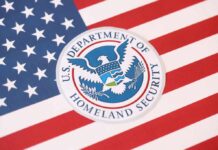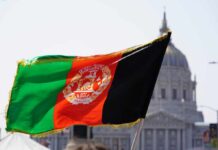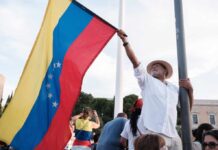
A new policy threatens religious freedom, sparking international tensions and potential U.S. military intervention.
Story Snapshot
- President Trump threatens military action in Nigeria over Christian persecution claims.
- Nigeria was designated as a “country of particular concern” for religious freedom violations.
- Nigerian President Tinubu defends his country’s record on religious freedom.
- Diplomatic tensions rise between the U.S. and Nigeria.
Trump’s Bold Stance on Religious Freedom
On October 31, 2025, President Donald Trump designated Nigeria as a “country of particular concern” for religious freedom violations. This move followed claims of widespread killings of Christians in the region. Trump has instructed the Pentagon to prepare for potential U.S. military intervention if the Nigerian government fails to address the violence. This unprecedented threat has raised concerns among international observers and has prompted Nigerian President Bola Ahmed Tinubu to defend his nation’s stance on religious freedom.
Watch: Trump threatens possible military action against Nigeria
Trump’s actions are largely influenced by American Christian advocacy groups, who have long pressed for increased U.S. involvement in protecting persecuted Christians abroad. The designation of Nigeria as a “country of particular concern” highlights the Trump administration’s commitment to prioritizing religious freedom in its foreign policy. This stance has been well-received by Trump’s evangelical base, who view it as a necessary step to safeguard Christian communities worldwide.
U.S. President Trump Threatens Military Action in Nigeria Over ‘Killing of Christians’https://t.co/X0kpvs2muu
— Moneycentral (@Moneycentral4) November 1, 2025
Nigeria’s Response and International Reactions
Nigerian President Bola Ahmed Tinubu has publicly rejected Trump’s characterization of Nigeria as religiously intolerant. Tinubu emphasized that his government is committed to addressing security challenges affecting citizens across all faiths and regions. The Nigerian government has been actively combating Boko Haram and other armed groups responsible for violence in the country. However, the complexity of the situation, involving religious, ethnic, and economic factors, complicates the narrative.
The potential U.S. intervention has stirred diplomatic tensions, with many international observers cautioning against external military involvement. Human rights organizations, including Amnesty International, have documented attacks on Christians but stress that the violence is not solely based on religion. The broader implications of U.S. military action in Nigeria could destabilize the region and undermine existing U.S.-Nigeria security cooperation.
Potential Consequences of U.S. Intervention
If the U.S. proceeds with military intervention, it could set a precedent for using military threats in response to religious freedom violations elsewhere. This approach risks increasing anti-U.S. sentiment in Nigeria and across the region. Economically, suspending aid to Nigeria could impact U.S. interests in oil and trade, further straining diplomatic relations.
As of now, U.S. aid to Nigeria remains in place, but under review. The situation continues to evolve, with ongoing debates in U.S. and international media about the appropriateness and potential consequences of U.S. military involvement. Stakeholders on both sides are weighing the impacts of these developments on domestic and international politics, focusing on maintaining sovereignty and human rights.
Sources:
Trump Threatens to Cut Off Aid to Nigeria Over Military Action

























